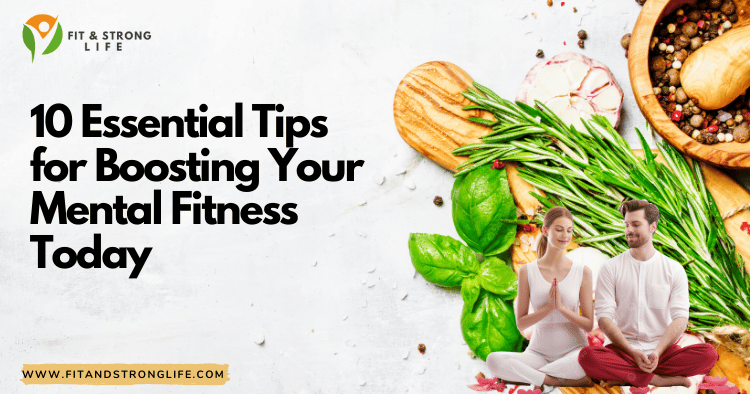Table of Contents
- Understanding Mental Fitness
- Tip 1: Prioritize Sleep
- Tip 2: Stay Physically Active
- Tip 3: Practice Mindfulness
- Tip 4: Connect with Others
- Tip 5: Challenge Your Brain
- Tip 6: Limit Screen Time
- Tip 7: Maintain a Balanced Diet
- Tip 8: Set Realistic Goals
- Tip 9: Seek Professional Help When Needed
- Tip 10: Practice Gratitude
- Conclusion
Understanding Mental Fitness
Mental fitness refers to our ability to think clearly, make sound decisions, and maintain emotional stability. Just like physical fitness, which involves exercises and nutrition, mental fitness is cultivated through practices that enhance our cognitive and emotional health. In today’s fast-paced world, strengthening your mental fitness is crucial for coping with stress, solving problems, and maintaining overall well-being.
“Mental fitness is as important as physical fitness; both require consistent practice and attention.”
Tip 1: Prioritize Sleep
Sleep is the foundation of mental fitness. Quality sleep enhances cognitive function, boosts mood, and improves memory. Adults typically need between 7-9 hours of sleep per night. Here are some tips for improving your sleep hygiene:
| Tip | Description |
|---|---|
| Create a Sleep Schedule | Go to bed and wake up at the same time every day, even on weekends. |
| Limit Screen Time | Avoid screens at least an hour before bedtime to reduce blue light exposure. |
| Create a Relaxing Environment | Make your bedroom dark, cool, and quiet for optimal sleep conditions. |
For more information on the importance of sleep, visit the Sleep Foundation.
“A good night’s sleep is not a luxury; it’s a necessity for mental clarity.”
Tip 2: Stay Physically Active
Regular physical activity is crucial for both physical and mental health. Exercise increases blood flow to the brain, releasing endorphins that improve mood and reduce anxiety. Aim for at least 150 minutes of moderate aerobic activity each week.
Quick Ideas to Stay Active:
- Take a brisk walk during lunch.
- Join a local sports team or fitness class.
- Try yoga or Pilates for relaxation and flexibility.
For detailed guidelines on physical activity, check out the CDC’s Physical Activity Recommendations. If you’re looking for top pre-workout foods to enhance performance, consider exploring our article on the Top 7 Pre-Workout Foods for Optimal Performance.
“Movement is a medicine for creating change in a person’s physical, emotional, and mental states.”
Tip 3: Practice Mindfulness
Mindfulness involves being fully present in the moment and can significantly reduce stress and anxiety. Practicing mindfulness can be as simple as focusing on your breath for a few minutes each day. You can also explore guided meditations through apps like Headspace or Calm.
Benefits of Mindfulness:
- Reduces stress levels.
- Enhances emotional regulation.
- Improves focus and attention span.
For guided mindfulness practices, visit Mindful.org.
“Mindfulness isn’t difficult; we just need to remember to do it.”
Tip 4: Connect with Others
Social connections are crucial for mental fitness. Engaging with friends, family, or community groups can provide emotional support and reduce feelings of isolation. Try to cultivate relationships that encourage open communication and positivity.
Ways to Connect:
- Join a club or group that shares your interests.
- Volunteer in your community.
- Schedule regular catch-ups with friends.
Learn more about the importance of social connections from Harvard Health Publishing.
“Human connection is the key to emotional resilience.”
Tip 5: Challenge Your Brain
Keeping your brain engaged is essential for mental agility. Activities like puzzles, reading, or learning a new skill can stimulate your mind and enhance cognitive functions.
Fun Brain-Boosting Activities:
- Solve crossword puzzles or Sudoku.
- Learn a new language using apps like Duolingo.
- Take up a musical instrument.
For a deeper look into brain health, visit Alzheimer’s Association.
“The brain, like any other muscle in your body, needs exercise to keep it strong and healthy.”
Tip 6: Limit Screen Time
In our digital age, it’s easy to lose track of how much time we spend on screens. Excessive screen time can lead to mental fatigue and decreased focus. Aim to limit non-essential screen time and take regular breaks.
Tips to Manage Screen Time:
- Set specific times for checking emails and social media.
- Use apps that track and limit your screen usage.
- Engage in screen-free activities like reading or outdoor hobbies.
For information on managing screen time effectively, check out the American Academy of Pediatrics.
“Quality time spent away from screens can rejuvenate your mind and spirit.”
Tip 7: Maintain a Balanced Diet
Nutrition plays a vital role in mental fitness. Foods rich in omega-3 fatty acids, antioxidants, and whole grains can enhance brain health. Aim for a balanced diet that includes fruits, vegetables, lean proteins, and healthy fats.
Brain-Boosting Foods:
| Food Type | Examples |
|---|---|
| Omega-3 Fatty Acids | Salmon, walnuts, flaxseeds |
| Antioxidants | Blueberries, dark chocolate, spinach |
| Whole Grains | Oats, quinoa, brown rice |
For more information on brain-healthy eating, visit Harvard Health. To fuel your fitness journey effectively, consider checking out our article on Top 10 Essential Vitamins and Minerals for Fitness Gains.
“You are what you eat; choose wisely for your mental health.”
Tip 8: Set Realistic Goals
Setting achievable goals can provide direction and motivation. Break down larger goals into smaller, manageable steps to prevent overwhelm and frustration.
SMART Goal Framework:
- Specific: Clearly define what you want to achieve.
- Measurable: Identify how you will measure progress.
- Achievable: Set realistic goals considering your resources.
- Relevant: Ensure your goals align with your values.
- Time-bound: Set a deadline for completion.
For more on effective goal-setting, visit MindTools.
“Goals are dreams with deadlines; make them actionable.”
Tip 9: Seek Professional Help When Needed
There’s no shame in seeking help from a mental health professional. Therapy or counseling can provide valuable tools and strategies to help you navigate life’s challenges. Don’t hesitate to reach out if you’re feeling overwhelmed.
Signs You Might Need Support:
- Persistent feelings of sadness or anxiety.
- Difficulty managing daily tasks.
- Strained relationships or isolation.
For resources, visit MentalHealth.gov.
“Asking for help is a sign of strength, not weakness.”
Tip 10: Practice Gratitude
Cultivating a mindset of gratitude can positively shift your perspective and improve your overall mental fitness. Start a gratitude journal where you list things you are thankful for each day. This simple practice can enhance your mood and resilience.
Benefits of Practicing Gratitude:
- Increases feelings of happiness.
- Reduces stress levels.
- Improves relationships with others.
For more tips on gratitude, check out Greater Good Science Center.
“Gratitude unlocks the fullness of life; it turns what we have into enough.”
Conclusion
Boosting your mental fitness is a continuous journey that requires effort and commitment. By incorporating these ten essential tips into your daily life, you can enhance your cognitive abilities, emotional resilience, and overall well-being. Remember, it’s okay to take small steps—every bit counts! Start today and feel the positive impact on your mental fitness.
Feel free to share your thoughts or experiences in the comments below! 🌟



